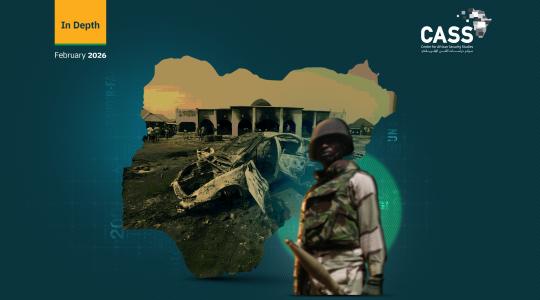Prior to the coup against President Mohamed Bazoum in July 2023, Niger was one of the United States’ most important security and military allies on the African continent. The U.S. had two military bases there, one of which—Base 201—was the American military’s most important air base in West Africa and the Sahel region. The U.S. had long used it as a launchpad for regular drone sorties to collect information on jihadist organizations, smuggling gangs, and organized crime in the south of the Sahara. Some 1,100 American special forces troops were also stationed at the base, charged with helping train the Nigerien army.
At first, Washington dealt calmly with the military coup in July 2023, refraining from describing it as a coup at all. As the new military junta forged ahead with its agenda, Congress suspended humanitarian aid, albeit without touching its military aid and prior agreements. It also opposed moves by the ECOWAS bloc to suspend ties with Niger, impose a blockade or intervene militarily to restore Bazoum. The U.S. even appointed an ambassador to Niger, without handing his credentials to the military junta, encapsulating its efforts to maintain a delicate balance between keeping some form of relationship with the military junta while refraining from recognizing its legitimacy.
On March 16, the junta even announced a new defense cooperation agreements with the U.S., following numerous meetings with an American delegation headed by US Assistant Secretary of State Molly Phee and the chief of the United States Africa Command, General Michael Langley over the previous days.
Yet it was noteworthy that Niger’s new de facto ruler, Military Council chief Abdourahamane Tchiani, refused to meet with the American delegation. Despite this, the American team extended its stay until March 14 in order to make amendments to the defense cooperation deal. Finally however, Niger informed the delegation that American forces must leave the country, tossing out the military deal on the basis that “it violates Niger’s constitutional and democratic rules.”
Reasons for the Split
Since the coup, Niger has strengthened its military and political relations with neighboring Burkina Faso and Mali—which also saw coups in recent months—as well as with Russia and Iran. This has bolstered Russian and Iranian influence in the Sahel and West Africa at the expense of European countries, notably France, as well as the U.S. This has raised fears among Western powers that Russia and Iran could threaten their interests across the Sahel and West Africa.
Niger has also turned into an arena for competition between regional powers in the Middle East, particularly Saudi Arabia and Iran. Tehran has had strong relations with successive Nigerien governments, despite the relative weakness of its development projects in Niger compared to those backed by Saudi Arabia.
Iran has supported the small Shiite minority in Niger, as with that of Mali, as it seeks to spread Shiite ideology and establish multiple pillars on which to build strong relations with the institutions of the Nigerien state. At first, it hesitated to take a position on Tchiani’s coup, but it later hosted representatives of the junta and began working to consolidate its relationship with them. To this end, it has promised to send Niger urgent financial aid, help the junta gain Russian recognition, and support them militarily, various sources told CASS.
Niger’s Military Council has also discussed forming a delegation to visit Iran, in order to discuss potentially huge Iranian investments in Niger, in several areas—most notably Uranium mining. This prompted Saudi Arabia to escalate its threats to cut aid to Niger in order to prevent the country from cooperating too closely with the Islamic Republic. Media outlets close to Riyadh have also called for the preservation of democracy and stability in West Africa and the Sahel.
Meanwhile, Niger’s military has continued to build security and military relations with Russia and Iran. Officials told CASS that Niger and Russia have agreed to transform Base 201 into the headquarters of the Russian army’s African Corps, under the umbrella of the Wagner paramilitary group, once U.S. forces have left. Russia’s possession of a military base and forces on the ground in Niger could lay the groundwork for an official agreement with the military junta, enabling it to monitor and collect information about potential threats from jihadists and other armed groups. It is quite possible that Russian drones will take the place of American ones in the skies over Niger in the near future.
In the same context, stationing Wagner and military forces in Niger will allow Russia to step up the pressure on Europe, by facilitating transit routes for migrant smuggling gangs across the Sahara and triggering greater flows of irregular migrants heading for European shores. This would pose a challenge to EU countries in general and southern Europe in particular. As a side benefit, Russia could also strengthen its logistical networks in Africa, allowing it to integrate itself into local migrant-smuggling networks and bring in extra revenues for its armed forces in the region.
Also of note is that Niger’s Prime Minister visited Iran in late January and signed several agreements with it, some of which remain secret. His visit raised fears that the two parties have reached a deal to allow Iran to explore for Uranium at undisclosed locations in Niger.
What Happens Next?
At the time of writing, Washington and Niamey had not yet reached a final agreement on the withdrawal of U.S. forces from Niger. However, all signs suggest that such a departure is inevitable, a development that will have major, complex repercussions for the region.
It is certain that an American withdrawal from Niger would weaken the capacity of the U.S. and European countries to collect intelligence on jihadist organizations, tackle them and rein in their expansion. This would allow these groups to grow in influence and pose an ever greater threat to European interests and influence in North and West Africa.
If forced to leave Niger, the U.S. military would likely consider redeploying to countries further southwest, such as Benin, Togo, Ghana, Guinea, and the Ivory Coast. However, these options lack the military infrastructure that the U.S. had established (at great expense) in Niger. They also suffer from porous borders, and are constantly threatened by jihadist organizations based in the Sahel.
Niger’s severing of its military relations with the U.S. will also weaken the latter’s ability to prevent Niamey from cooperating with Tehran, including by providing it with uranium. Former President Mohamed Bazoum had fallen in line with the American policy of refusing to sell the radioactive metal to Iran or to intermediaries likely to sell it on to Iranian buyers. In contrast, Niger’s ruling junta has openly expressed its readiness to cooperate with Iran in various fields, and Uranium is unlikely to be an exception.




